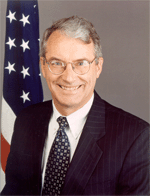This piece was reprinted by OpEd News with permission or license. It may not be reproduced in any form without permission or license from the source.
Cross-posted from Consortium News
Thomas Fingar, who served as U.S. Director of the National Intelligence Council in the wake of the Iraq War intelligence fiasco.
Thomas Fingar, former U.S. Director of the National Intelligence Council, will receive the annual award from Sam Adams Associates for Integrity in Intelligence in recognition of Fingar's work from 2005 to 2008 restoring respect for the battered discipline of U.S. intelligence analysis after the fraudulent assessments on Iraq's non-existent WMD.
In 2007, as chief of intelligence analysis, Fingar managed a thoroughly professional -- and unsparingly honest -- National Intelligence Estimate on the live-wire issue of Iran's nuclear program. That NIE was instrumental in thwarting plans by President George W. Bush and Vice President Dick Cheney to attack Iran before they left office.
Thus, in the Iran NIE of early November 2007, all 16 U.S. intelligence agencies judged "with high confidence" that Iran had halted its nuclear weapon design and weaponization work in 2003. That key judgment has been revalidated in testimony to Congress every year since.
Fingar, now a professor at Stanford, is teaching in its overseas program at Oxford in the United Kingdom. The award -- named for the late CIA analyst Sam Adams who challenged the U.S. military's overly optimistic claims about Vietcong and North Vietnamese troop strength during the Vietnam War -- will be presented to Fingar at the historic Oxford Union.
Discussing his upcoming award with Sam Adams Associates, Fingar showed little patience with the nonsensical charges that he and his analysts had to endure after the NIE on Iran hit the streets. He reminded us:
"The whole purpose was to provide as accurate and objective a picture of what we knew at the time. To have done otherwise would have been unprofessional and inconsistent with the reason we have an intelligence establishment."Every other characterization of security-related affairs provided to decision makers has, or is assumed to have, a policy agenda. The Intelligence Community exists not just to provide analyses based on 'all' the information available to others -- plus, when it can get it, information not available to others -- but also, and more importantly, to assemble and assess the information as objectively as possible.
"The job of the Intelligence Community is to help decision makers to make better-informed decisions. It most emphatically is not to lead or pressure them to decide issues in a particular way. ... It is also the reason we spend billions of dollars on intelligence analysis. ... In a fundamental way, we were simply 'doing our jobs' when we produced the Iran NIE.
"Those who did not like the conclusions knew or soon realized that they could not challenge our findings by disputing the existence or meaning of our evidence, so they pursued a different course. The ploy was completely transparent: allege that those who wrote the NIE were intelligence amateurs who had a political agenda, and claim that the alleged principal authors had been career-long opponents of President Bush.
"There are many 'problems' with this line of attack -- problems that were overlooked by a remarkable number of journalists. ... I didn't write the NIE but, at the time, I had 37 years of intelligence experience -- probably no longer an amateur.
"Neocon critics never explained why, if I had been a career-long opponent of George W. Bush, he had nominated me to be an assistant secretary of state, endorsed my selection as the first Deputy Director of National Intelligence for Analysis, and approved my selection to supervise preparation of materials for his daily briefing."
Blocking a Dash to War
Without doubt, the NIE on Iran's nuclear program made another rash decision to go to war in the Middle East untenable.
I myself have been involved in intelligence analysis for 50 years -- 27 at the CIA; two as an Army infantry/intelligence officer, and the rest as a close observer. Yet, the November 2007 NIE is the only one I know of that deserves unambiguous credit for stopping an unnecessary war, one that could have been even more disastrous than the Bush administration's excellent adventure in Iraq.
Don't take my word for it. In his memoir Decision Points, President George W. Bush acknowledged that the "eye-popping" findings of the 2007 NIE "tied my hands on the military side. ... After the NIE, how could I possibly explain using the military to destroy the nuclear facilities of a country the intelligence community said had no active nuclear weapons program?
"I don't know why the NIE was written the way it was ... I certainly hoped intelligence analysts weren't trying to influence policy. Whatever the explanation, the NIE had a big impact -- and not a good one."
As Bush's comment made clear, intelligence analysts do not operate in a political vacuum. The real professionals, however, construct a protective shield against political influence, bias and an understandable-but-anathema eagerness to please superiors in the White House.
(Note: You can view every article as one long page if you sign up as an Advocate Member, or higher).





